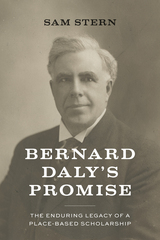2 books about Educational benefactors

Bernard Daly's Promise
The Enduring Legacy of a Place-based Scholarship
Sam Stern
Oregon State University Press, 2022
Published in cooperation with the Dr. Daly Project Association
Bernard Daly escaped the Irish Famine and with his family emigrated to America, where he became the town doctor in Lakeview, Oregon, and then a state legislator, Oregon Agricultural College regent, county judge, rancher, and banker. When he died in 1920, his estate, valued at about a million dollars, established a college scholarship for the youth of Lake County, ensuring that most of them could attend college.
It’s hard to imagine a place more distant from higher education than Lake County in south central Oregon, a county about the size of New Jersey with a population under eight thousand. When the Bernard Daly scholarship was first awarded in 1922, less than two percent of America’s youth went to college, and the percentage was even lower in Lake County.
Today, Lake County students are much more likely to go to college, graduate in four years without debt, go on to graduate school, have successful careers, and contribute to the larger community—all because of a scholarship established a hundred years ago by an immigrant who sought a better life, not only for himself but also for others.
Drawing on more than a hundred personal interviews, an extensive web-based survey, and archival materials, Bernard Daly’s Promise offers unique insights into the benefits of higher education and how it might best be supported—questions that we are struggling with today.
Bernard Daly escaped the Irish Famine and with his family emigrated to America, where he became the town doctor in Lakeview, Oregon, and then a state legislator, Oregon Agricultural College regent, county judge, rancher, and banker. When he died in 1920, his estate, valued at about a million dollars, established a college scholarship for the youth of Lake County, ensuring that most of them could attend college.
It’s hard to imagine a place more distant from higher education than Lake County in south central Oregon, a county about the size of New Jersey with a population under eight thousand. When the Bernard Daly scholarship was first awarded in 1922, less than two percent of America’s youth went to college, and the percentage was even lower in Lake County.
Today, Lake County students are much more likely to go to college, graduate in four years without debt, go on to graduate school, have successful careers, and contribute to the larger community—all because of a scholarship established a hundred years ago by an immigrant who sought a better life, not only for himself but also for others.
Drawing on more than a hundred personal interviews, an extensive web-based survey, and archival materials, Bernard Daly’s Promise offers unique insights into the benefits of higher education and how it might best be supported—questions that we are struggling with today.
[more]

Dethroning historical reputations
universities, museums and the commemoration of benefactors
Edited by Jill Pellew and Lawrence Goldman
University of London Press, 2018
The campaigns in universities across the world to reject, rename and remove historic benefactions have brought the present into collision with the past. In Britain the attempt to remove a statue of one of Oxford’s most famous benefactors, the imperialist Cecil Rhodes, has spread to other universities and their benefactors, and now also affects civic monuments and statues in towns and cities across the country. In the United States, memorials to leaders of the Confederacy in the American Civil War and to other slaveholders have been the subject of intense dispute. Should we continue to honour benefactors and historic figures whose actions are now deemed ethically unacceptable? How can we reconcile the views held by our ancestors with those we now hold today? Should we even try, acknowledging, in the words of the novelist L. P. Hartley, that ‘the past is another country; they do things differently there’? The essays in this interdisciplinary collection are drawn from a conference at the Institute of Historical Research in the University of London. Historians, fundraisers, a sociologist and a museum director examine these current issues from different perspectives, with an introductory essay by Sir David Cannadine, president of the British Academy. Together they explore an emerging conflict between the past and present, history and ideology, and benefactors and their critics. The open access edition of this book can be found at http://humanities-digital-library.org/index.php/hdl/catalog/book/pellewgoldman.
[more]
READERS
Browse our collection.
PUBLISHERS
See BiblioVault's publisher services.
STUDENT SERVICES
Files for college accessibility offices.
UChicago Accessibility Resources
home | accessibility | search | about | contact us
BiblioVault ® 2001 - 2024
The University of Chicago Press









